Plot
At the beginning of the novel, Lol Stein (her middle initial is omitted in the English translation) is a woman in her thirties. She was born and raised in S Tahla in a bourgeois family and is engaged to Michael Richardson at 19. However, at a ball in the seaside resort of T Beach, Michael Richardson leaves Lol for Anne-Marie Stretter, an older woman. After a difficult recovery from this shock which marks her for the rest of her life, Lol marries John Bedford, a musician she meets on one of her daily walks. Lol leaves S Tahla with her husband.
Ten years later, with three children, Lol is an established woman with no time for fantasy. She returns with her family to S Tahla and moves into the house she grew up in. Lol goes on her daily walks as she did ten years before. She thinks she recognises Tatiana Karl one day, the friend who consoled her after her breakup with Michael Richardson. The man who accompanies Tatiana makes a deep impression on Lol.
Lol reestablishes her contact with Tatiana and gets to know both her husband and her lover, Jacques Hold. Lol is able to get information from Jacques about events at the ball at T Beach 10 years before. Lol reveals to Jacques her interest in him but forbids him to stay with her instead of Tatiana.
Lol spies on Tatiana and her lover but Jacques notices her. One day Lol tells Jacques that she has been to T Beach alone and plans to return with him. While doing this, Lol shows Jacques the room where she and Michael Richardson had split up. Lol and Jacques spend the night together. The next day, Jacques has one last meeting with Tatiana Karl.
The novel is seen through the obsessive eyes of Jacques Hold.
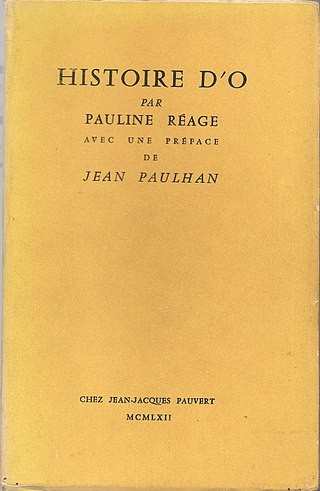
Story of O is an erotic novel written by French author Anne Desclos under the pen name Pauline Réage, with the original French text published in 1954 by Jean-Jacques Pauvert.

Die Fledermaus is an operetta composed by Johann Strauss II to a German libretto by Karl Haffner and Richard Genée, which premiered in 1874.

Marguerite Germaine Marie Donnadieu, known as Marguerite Duras, was a French novelist, playwright, screenwriter, essayist, and experimental filmmaker. Her script for the film Hiroshima mon amour (1959) earned her a nomination for Best Original Screenplay at the Academy Awards.
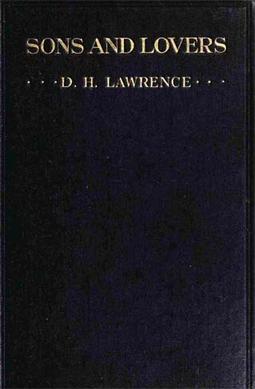
Sons and Lovers is a 1913 novel by the English writer D. H. Lawrence. It traces emotional conflicts through the protagonist, Paul Morel, and his suffocating relationships with a demanding mother and two very different lovers, which exert complex influences on the development of his manhood. The novel was originally published by Gerald Duckworth and Company Ltd., London, and Mitchell Kennerley Publishers, New York. While the novel initially received a lukewarm critical reception, along with allegations of obscenity, it is today regarded as a masterpiece by many critics and is often regarded as Lawrence's finest achievement. It tells us more about Lawrence's life and his phases, as his first was when he lost his mother in 1910 to whom he was particularly attached. And it was from then that he met Frieda Richthofen, and around this time that he began conceiving his two other great novels, The Rainbow and Women in Love, which had more sexual emphasis and maturity.
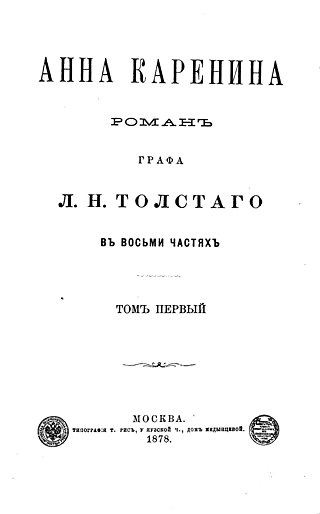
Anna Karenina is a novel by the Russian author Leo Tolstoy, first published in book form in 1878. Tolstoy called it his first true novel. It was initially released in serial installments from 1875 to 1877, all but the last part appearing in the periodical The Russian Messenger. By the time he was finishing up the last installments Tolstoy was in an anguished state of mind and, having come to hate it, finished it unwillingly.

Lady Chatterley's Lover is the final novel by English author D. H. Lawrence, which was first published privately in 1928, in Florence, Italy, and in 1929, in Paris, France. An unexpurgated edition was not published openly in the United Kingdom until 1960, when it was the subject of a watershed obscenity trial against the publisher Penguin Books, which won the case and quickly sold three million copies. The book was also banned for obscenity in the United States, Canada, Australia, India and Japan. The book soon became notorious for its story of the physical relationship between a working-class man and an upper-class woman, its explicit descriptions of sex and its use of then-unprintable profane words. It entered the public domain in the United States in 2024.

The Metamorphoses of Apuleius, which Augustine of Hippo referred to as The Golden Ass, is the only ancient Roman novel in Latin to survive in its entirety.

Waiting to Exhale is a 1995 American romantic comedy-drama film directed by Forest Whitaker and starring Whitney Houston and Angela Bassett. The film was adapted from the 1992 novel of the same name by Terry McMillan. Lela Rochon, Loretta Devine, Dennis Haysbert, Michael Beach, Gregory Hines, Donald Faison, and Mykelti Williamson rounded out the rest of the cast. The original music score was composed by Kenneth "Babyface" Edmonds. The story centers on four women living in the Phoenix metropolitan area and their relationships with men and one another.

The Hours, a 1998 novel by the American writer Michael Cunningham, is a tribute to Virginia Woolf's 1923 work Mrs Dalloway. Cunningham emulates elements of Woolf's writing style while revisiting some of her themes in different settings. The Hours won the 1999 Pulitzer Prize for Fiction and the 1999 PEN/Faulkner Award for Fiction, and was later made into an Oscar-winning, 2002, eponymous film.

Elizabeth Hadley Richardson was the first wife of American author Ernest Hemingway. The two married in 1921 after a courtship of less than a year, and moved to Paris within months of being married. In Paris, Hemingway pursued a writing career, and through him Richardson met other expatriate American and British writers.
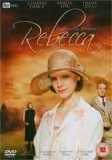
Rebecca is a 1997 British-German television drama directed by Jim O'Brien. The teleplay by Arthur Hopcraft is based on the 1938 novel of the same name by Daphne du Maurier. The serial was filmed for Carlton Television by Portman Productions in association with WGBH and Tele München.
"Eliduc" is a Breton lai by the medieval poet Marie de France. The twelfth and last poem in the collection known as The Lais of Marie de France, it appears in the manuscript Harley 978 at the British Library. Like the other poems in this collection, "Eliduc" is written in the Anglo-Norman dialect of Old French, in couplets of eight syllables in length. At 1184 lines, it is the longest of the lais attributed to Marie de France. The text of the lai notes that its correct title should be Guildeluec and Guilliadon, but the name Eliduc has stuck.

The Midnight Bell is a gothic novel by Francis Lathom. It was first published anonymously in 1798 and has, on occasion, been wrongly attributed to George Walker. It was one of the seven "horrid novels" lampooned by Jane Austen in her novel Northanger Abbey.
Dear creature! How much I am obliged to you; and when you have finished Udolpho, we will read the Italian together; and I have made out a list of ten or twelve more of the same kind for you.
Have you, indeed! How glad I am! What are they all?
I will read you their names directly; here they are, in my pocketbook. Castle of Wolfenbach, Clermont, Mysterious Warnings, Necromancer of the Black Forest, Midnight Bell, Orphan of the Rhine, and Horrid Mysteries. Those will last us some time.
Yes, pretty well; but are they all horrid, are you sure they are all horrid?
—Northanger Abbey, ch. 6

Emmeline, The Orphan of the Castle is the first novel written by English writer Charlotte Smith; it was published in 1788. A Cinderella story in which the heroine stands outside the traditional economic structures of English society and ends up wealthy and happy, the novel is a fantasy. At the same time, it criticises the traditional marriage arrangements of the 18th century, which allowed women little choice and prioritised the needs of the family. Smith's criticisms of marriage stemmed from her personal experience and several of the secondary characters are thinly veiled depictions of her family, a technique which both intrigued and repelled contemporary readers.
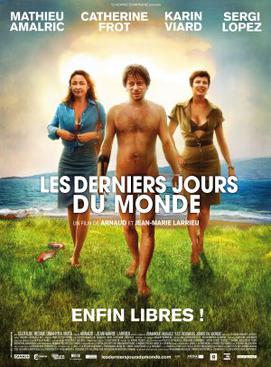
Happy End is a 2009 apocalyptic comedy-drama film written and directed by Arnaud and Jean-Marie Larrieu, based on the 1991 novel Les Derniers Jours du monde by Dominique Noguez. The film depicts the story of a man, Robinson, who travels across France and Spain during the end of the world.
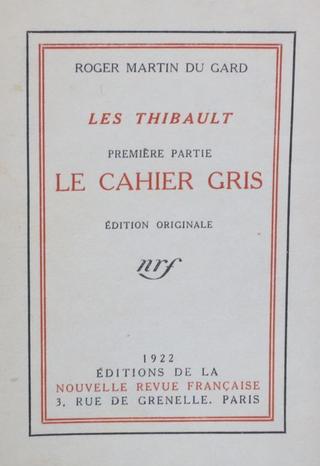
The Thibaults is a multi-volume roman-fleuve by Roger Martin du Gard, which follows the fortunes of two brothers, Antoine and Jacques Thibault, from their upbringing in a prosperous Catholic bourgeois family to the end of the First World War. The author was awarded the 1937 Nobel Prize in Literature largely on the basis of this novel sequence.

Smoke is an 1867 novel by the Russian writer Ivan Turgenev (1818–1883) that tells the story of a love affair between a young Russian man and a young married Russian woman while also delivering the author's criticism of Russia and Russians of the period. The story takes place largely in the German resort town of Baden-Baden.

Il Piacere (Pleasure) is the first novel by Gabriele D'Annunzio, written in 1889 at Francavilla al Mare, and published the following year by Fratelli Treves. Beginning in 1895, the novel was republished with the heading I Romanzi della Rosa, forming a narrative cycle including The Intruder, and Triumph of Death.

Madeleine Férat is an 1868 novel by the French writer Émile Zola. It was Zola's fourth novel, written immediately after Thérèse Raquin, which had been Zola's first commercial and artistic success. It was published in 1868, first under the title La Honte in serial form, then in volume under the title Madeleine Férat by Albert Lacroix, with a dedication to the painter Manet. It is the fictionalised version of a play which had not been accepted.

Étude de femme is a short story by Honoré de Balzac. It was published in 1830 and is one of the Scènes de la vie privée of La Comédie humaine.



















